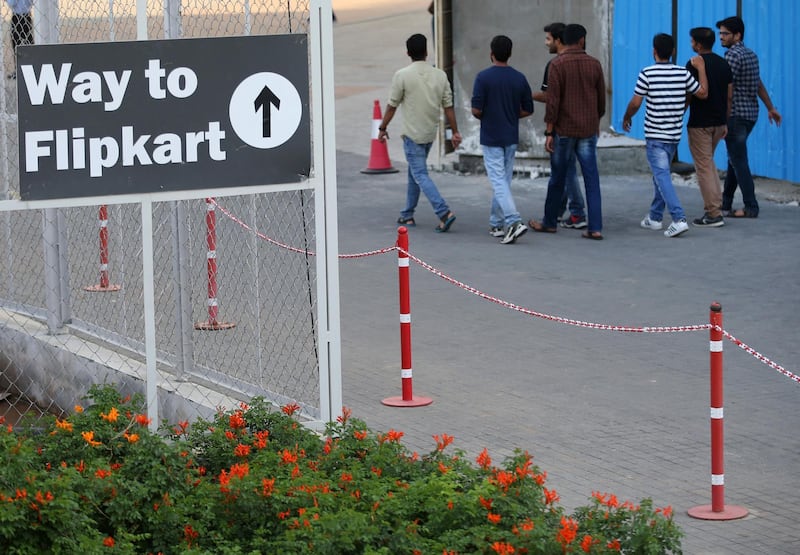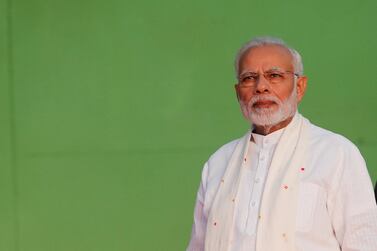Concerned about the impact of online shopping on their business, brick-and-mortar retailers in India had long been lobbying the government to tighten rules on e-commerce giants in India.
Traditional retailers like Prashant Redekar, who runs a mobile phone shop in Mumbai, are pleased that India plans to roll out a new foreign direct investment (FDI) e-commerce policy on Friday, which will place restrictions on discounting and exclusive tie-ups with brands.
“We've definitely seen a decline in footfall because of online shopping,” says Mr Redekar. E-commerce marketplaces “are giving discounts that you won't get in the shops and some phones are only available online”. Many mobile phone shops have already closed down because they could not survive the intense competition from online retailers and he hopes the new regulations will help ensure that his business does not suffer the same fate.
But foreign-owned e-commerce companies such as Amazon and Flipkart, which dominate the e-commerce sector in India, are understood to be highly concerned about the impact of the new regulations on their revenues and want New Delhi to postpone, or scrap the launch of the policy altogether.
The new restrictions could reduce online sales by $46 billion (Dh168.8bn) by 2022, Reuters cited a draft analysis by PwC as estimating.
Under the new FDI policy, India plans to ban e-commerce firms including US-based Amazon and Flipkart, which is majority owned by US retail giant Walmart, barring them to sell products from companies in which they own equity. The rules also state that e-commerce firms will not be able to “directly or indirectly influence the sale price of goods or services”, and they will be banned from selling products exclusively on their websites.
Publicly, affected e-commerce firms have refrained from criticising the move.
"We have always operated in compliance with the laws of the land and are evaluating the new guidelines to engage as necessary with the government to gain clarity so that we remain true to our commitment," Amazon said in an emailed statement to The National.
"With more than 400,000 small and medium businesses on our marketplace enabling customer choice to buy anything online, we remain committed to a long term investment in our vision of transforming how India buys and sells and generating significant direct and indirect employment.”
The company has a lot at stake. It has earmarked $5.5bn of investment for India, while Walmart last year forked out $16bn for a majority stake in the market leader Flipkart, based in Bangalore.
They are banking on the vast potential of the sector in what is the world's fastest growing major economy.
India's e-commerce market is expanding by 30 per cent a year in terms of gross merchandise value and is expected to be worth $200bn by 2027, helped by a rapid rise in the number of internet users, according to a report by Morgan Stanley.
But traditional shops still account for the lion's share of the retail market in the country.
Online sales made up just 2 per cent of retail sales in India in the financial year to the end of last March, according to Morgan Stanley. The US lender forecasts that sales made over the internet will still only account for 12 per cent of the overall retail market in a decade.
“The fact that there are just two or three players serving a market of 1.3 billion people is an indicator of an oligopoly in the making,” says Aditya Pratap, a lawyer who is the founder of Aditya Pratap and Associates. “Major corporations funded by billions in investor dollars start burning cash with a view to eject smaller rivals from the market or acquire them outright, eliminating any competition.”
With a general election due to be held by May, some critics believe that the policy is designed to win over a critical vote bank of small retailers and traders.
“I think broadly the policy is a move in the wrong direction,” says Srikanth Iyer, the co-founder and chief executive of Homelane.com, an online home interiors start-up, funded by American venture capital firms Sequoia and Accel. “It's probably been done with an eye on the elections.”
The restriction on discounting “is anti-business in itself”, he adds.
The Narendra Modi government, since it came to power, has made efforts to roll out the red carpet to foreign investors, to boost the economy and create much-needed jobs. That makes the policy a concern, Mr Iyer says.
“I think all these rules, which have been proposed, are only going to drive investments away from India,” he says.
He hopes that he government will “roll back the policy as this government has been business-friendly over the last four-and-a-half years.”
The PwC analysis cited by Reuters estimates that 1.1 million fewer jobs would be created by 2022 as a consequence of the new regulations.
“It will definitely create, for a moment, some kind of a stop to the growth,” says Mayur Saraswat, the head of the digital, IT and telecom vertical at Teamlease Services, an Indian human resources firm. “The job creation pace may slow down. It's a matter of how this policy is implemented on the ground.”
The policy would mean that consumers would miss out on the steep discounts they have enjoyed, funded by the deep pockets behind the major online shopping marketplaces.
“The large e-commerce companies have tried to create a monopolistic situation,” says JP Shukla, the founder and chief executive of Family Mart, a retail chain with 80 stores across India, selling general merchandise and fashion goods.
“The entire retail [sector] is at risk. If you take the books of any of the large portals, I think everyone is bleeding. That's not the right way of doing business.”
This all comes amid growing competition within the e-commerce sector. India's Reliance Industries, a conglomerate controlled by the country's richest man Mukesh Ambani, with interests ranging from oil to telecoms, this month announced plans to launch a new e-commerce platform, which would compete with Amazon and Flipkart, but would not face the restrictions of the new FDI policy.
That is a concern for traditional retailers already seeing an impact from e-commerce.
“What's been happening recently in the malls, people go to a store and look at a product and they would not end up buying – they'd take a photo and go online and order it at a deep discount,” says Shreyansh Kapoor, the vice president of Kashi Jewellers, a jewellery retailer in India. “So the whole effort and hard work the offline retailer puts in [is wasted].”
Less expensive items such as simple rings are more affected by online sales, the big-ticket jewellery purchases are not impacted much as Indians still want to go to a store for the experience and quality assurance, he explains.
Rakesh Dugar, the chairman and managing director of Mitashi Edutainment, a consumer durables and electronics brand, says that the aggressive discounts which have driven India's e-commerce boom are "not healthy for the associated brands or the platforms themselves in the long run".
"The government's announcement shows that it has studied the e-commerce business model in detail and suggested systematic provisions to be taken to ensure a more level playing field going forward and allowing fair competition between the different retail channels," he says.
Ultimately, the proof will be in the policy's implementation.
"Now it remains to be seen how effectively they are able to implement, monitor and control these rules and offer a level playing field for the millions of retailers of our country," says Mr Dugar.







